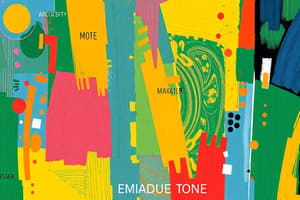Podcast
Questions and Answers
What is the primary focus of a BA English Honours degree?
What is the primary focus of a BA English Honours degree?
- English literature, language, and critical thinking (correct)
- Scientific research methods and experiments
- Historical events and geopolitics
- Mathematical principles and theories
Which of the following is NOT a core area of study in a BA English Honours program?
Which of the following is NOT a core area of study in a BA English Honours program?
- Mathematics (correct)
- Literature
- Creative Writing
- Critical Theory
What skill is primarily developed through essays, presentations, and discussions in this program?
What skill is primarily developed through essays, presentations, and discussions in this program?
- Mathematical skills
- Technical skills
- Analytical skills (correct)
- Mechanical skills
Which literary theory focuses on the relationship between text and social contexts?
Which literary theory focuses on the relationship between text and social contexts?
What type of writing is emphasized in the Creative Writing component of the degree?
What type of writing is emphasized in the Creative Writing component of the degree?
Which of the following career paths is typically associated with a BA English Honours degree?
Which of the following career paths is typically associated with a BA English Honours degree?
What are the admission requirements for a BA English Honours program?
What are the admission requirements for a BA English Honours program?
Which assessment method is likely to be used in this program?
Which assessment method is likely to be used in this program?
Study Notes
Overview of BA English Honours
- A bachelor's degree focusing on English literature, language, and critical thinking.
- Typically a three to four-year program, varying by institution.
Core Areas of Study
-
Literature
- Study of various genres including poetry, prose, and drama.
- Focus on different periods: Romantic, Victorian, Modern, Postmodern.
- Critical analysis of texts to understand themes, contexts, and styles.
-
Language
- Exploration of linguistic principles, semantics, and syntax.
- Study of language acquisition, phonetics, and sociolinguistics.
-
Critical Theory
- Introduction to major literary theories: Structuralism, Post-structuralism, Feminism, Marxism, etc.
- Understanding the application of these theories to texts.
-
Creative Writing
- Development of skills in writing fiction, poetry, and non-fiction.
- Emphasis on workshop settings for peer feedback and refinement of writing.
-
Cultural Studies
- Examination of literature in relation to social, political, and cultural movements.
- Discussions about identity, representation, and diversity in literary works.
Skills Developed
- Analytical Skills: Ability to interpret and critique texts critically.
- Communication: Enhanced writing and verbal skills through essays, presentations, and discussions.
- Research Proficiency: Skills in gathering and synthesizing information from various sources.
- Creative Thinking: Ability to generate original ideas and narratives.
Career Opportunities
- Teaching (primary, secondary or higher education)
- Writing (journalism, content creation, creative writing)
- Editing and Publishing
- Public Relations and Communications
- Social Work and Community Services
Further Studies
- Opportunities for postgraduate studies such as MA in English, Creative Writing, or Education.
- Consideration of related fields like Media Studies or Cultural Studies.
Admission Requirements
- High school diploma with a focus on English subjects.
- Some institutions may require entrance exams or a portfolio of writing samples.
Assessment Methods
- Combination of essays, exams, presentations, and practical assignments (e.g., creative projects).
- Participation in discussions and peer assessments may also contribute to grades.
Overview of BA English Honours
- A 3-4 year program with a focus on literature, language, critical thinking, and developing communication and analytical skills.
- Typically involves intensive study of various genres, periods, and literary theories.
Core Areas of Study
- Literature: Study of poetry, prose, drama, and various literary periods, offering a deeper understanding of themes, contexts, and styles.
- Language: Explores linguistic principles, semantics, syntax, and investigates language acquisition, phonetics, and sociolinguistics.
- Critical Theory: Introduces major literary theories like Structuralism, Post-structuralism, Feminism, and Marxism, applying them to literary texts.
- Creative Writing: Emphasizes development of writing skills, honing skills through workshops while receiving peer feedback.
- Cultural Studies: Examines literature in relation to social, political, and cultural movements, fostering conversation around identity, representation, and diversity in literature.
Skills Developed
- Analytical Skills: Develop critical thinking and the ability to interpret and critique texts.
- Communication: Enhances writing and verbal skills through essays, presentations, and discussions.
- Research Proficiency: Develops skills in gathering and synthesizing information from various sources.
- Creative Thinking: Encourages original ideas and narrative development.
Career Opportunities
- Teaching (primary, secondary, or higher education)
- Writing (journalism, content creation, creative writing)
- Editing and Publishing
- Public Relations and Communications
- Social Work and Community Services
Further Studies
- Opportunities for postgraduate studies such as MA in English, Creative Writing, or Education.
- Opens doors to related fields like Media Studies or Cultural Studies.
Admission Requirements
- Typically requires a high school diploma with a focus on English subjects.
- Some institutions may require entrance exams or a portfolio of writing samples.
Assessment Methods
- Grades are typically a combination of essays, exams, presentations, practical assignments (creative projects).
- Active participation in discussions and peer assessments can also contribute to grades.
Studying That Suits You
Use AI to generate personalized quizzes and flashcards to suit your learning preferences.
Description
This quiz provides an overview of the BA English Honours degree, covering its core areas of study such as literature, language, critical theory, creative writing, and cultural studies. Explore the key concepts and themes within each area to better understand this multifaceted program.




